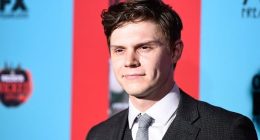
Way back in 2014, a relatively small indie film became the unexpected smash hit of the year, garnering critical acclaim, sparking political campaigns and earning some $233 million off a $14 million budget. An awards season darling, it would amass a total of 22 nominations from the Oscars, BAFTAs and Golden Globes alone. But for all the shortlists, the only major award The Imitation Game came away with was the best adapted screenplay Oscar for its debut writer Graham Moore.
It’s been eight long years since then, but Moore is now finally ready to unleash his next project, a film that also marks his directorial debut. Set in 1950s Chicago, The Outfit — co-written with Johnathan McClain and backed by Focus Features — stars Mark Rylance as Leonard, a softly-spoken English master suit maker (or “cutter” as he prefers to be called) whose clients just happen to be the local mob. A wholly different take on the standard mafia crime drama, the film — also starring Zoey Deutch, Dylan O’Brien and Johnny Flynn — unfolds over a single night of stitching and stitch-ups in Leonard’s small tailor shop.
Speaking to The Hollywood Reporter ahead of The Outfit’s world premiere in Berlin on Monday, Moore discusses his late grandfather’s key role in the film, reflects on the legacy of The Imitation Game and reveals the unlikely spot he keeps his Oscar.
The Outfit is a really interesting and different take on the usual mob drama. Where did the idea come from?
This film really began with my grandfather, Charlie. He was the kindest, most gentle and caring man I have ever known and, after my parents split up, had a really active role in my life and became like a father figure. He was a small-town doctor, and one of his patients was the notorious mobster Jerry Catena. And this was always fascinating to me, this relationship between a really sweet gentle soul and the vicious killer in whose service he worked.
So how did this become entwined in a story about a tailor?
For years, it was rattling around the back of my head. And then a few years ago, after my grandfather had passed away, my friend and co-writer Johnathan McClain said to me that nobody had done a film about a Savile Row tailer before. We were both interested in the psychology of tailoring and these people who spend decades training and learning these really difficult, esoteric crafts. We knew we wanted to write something about an expert craftsman locked away making these beautiful clothes, but could never find a story for him. And then one day we were poking through a book about tailoring history and found this single sentence about how the first bug the FBI ever planted was in 1956, and it was in a tailor shop in Chicago, Illinois. And instantly the whole story kind of clicked into place for us. The whole script came together very quickly from there.
The Outfit is only your second film, yet you’re already taking the leap from writing to directing. How was the experience?
Going from screenwriting to directing my first film was not a challenge to take lightly. I think, in my head, it was about taking responsibility for the film. It’s like, I have the script, I think this film could be wonderful, and rather than hand this piece of paper to someone else and say, ‘Can you please make this for me because I don’t know how,’ I should figure out how to make it myself.
Has it given you newfound respect for directors?
Yeah, it has. I remember when we were making The Imitation Game and working very closely with my friend Morten [Tyldum], and he said that being a director is all about putting your name behind every single decision. Candlesticks in the background, every acting choice, every cut – you have to be able to put your name on every decision and, even though you’re sometimes going to be right and wrong, you’re standing behind it.
For a directorial debut, the cast is pretty phenomenal, and with Mark Rylance you’ve obviously got a fellow Oscar winner. Was this an easy feat to cast him?
I will say that for anyone directing his or her first film, I highly recommend putting Mark Rylance at the center. Directing a film gets so much easier. All you really have to do is say ‘Hey,’ point the camera at him and then never have to say another word because something wonderful will happen from that point forward. But I’m always pessimistic about the casting process, and never dreamed I’d get someone of Mark’s caliber to be at the center of this film. I’m not even sure there are any other actors of Mark’s caliber in the world. But we sent him the script very early on, and he really sort of lit up and got what it was. He’s not only a great actor, he’s a great leader of the acting company, I think from his time in the theater. He’s very into creating a community of performers and artists on set.
It’s been eight years since The Imitation Game. Is there any particular reason for the wait before your second film?
I’ve published two novels and written a handful of scripts that never got made. Maybe they will at some point, but it’s just sort of the ups and downs of things. I feel like any film path to production is an odd and circuitous route. Even with The Outfit, when we were getting ready to film, COVID broke out and we thought that would be the end of it. I would say that while it was so amazing to direct my first film, I’m really excited to direct a film not during a global pandemic.
How was it dealing with the aftermath of that film, which was so phenomenally successful. Did it feel at all overwhelming at times?
Yeah, it was overwhelming. When we made the film, it was really small, it was made independently and when we shot it, it didn’t even have distribution anywhere in the world. I remember being on set and wondering if it was going to be in theaters, because it wasn’t a given at that point. And then I think the sudden overwhelming deluge of the release experience was overwhelming for a lot of us. It was very gratifying — it was a film we all believed in so much, and it was exciting to see other people catch on to it. I think that it required, certainly for me, some time alone in a dark room for a while afterwards. But it was helpful for all of us to remind ourselves that the film was about Alan Turing, so all the celebrity stuff going on around the movie was to be put in the service of Alan Turing.
During the awards campaign, there was some discomfort about ads urging voters to honor Turing by voting for the film. But on the flip side, The Imitation Game did help push through a new law in England pardoning those convicted under historic anti-homosexual legislation. How do you feel now looking back at the film’s legacy?
I have a one-year-old son, and a friend recently sent him an illustrated children’s book about Alan Turing. Just yesterday I was reading to him — he’s one, so I don’t think he knows what I’m reading — but there were these illustrations that seemed very much inspired by shots from our film. So it’s amazing to think that this was the point — not the film, but that there’s all of this other wonderful Turing material that gets to come into the world, and we were able to help make this possible.
Where do you keep your Oscar?
After we had a baby, what was my office at home became the baby room. So my Oscar is in a closet with all the diapers. It’s a good reminder of where I stand in the house.
Source: HollyWood








